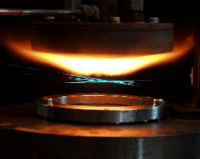Research
The main areas of research at the division are:
- Power plant cycle Analyses
- Combustion processes
- Experimental Fluid Dynamics
- Gas turbine aero-thermal engineering
- Power plant health monitoring (ANN and traditional modeling)
Cycle analysis
The aim of this research discipline is to develop and improve the theoretical methods for analysis, optimization and simulation of thermal power processes.
There is a continuous improvement in system analysis and new cycles are suggested, with new unknown components, working with new media. Our aim is to use data from experimental studies to evaluate the developed theoretical models for simulation of these advanced cycles and their components.
The goal of this project is to develop and improve the theoretical methods for analysis, optimization and simulation of thermal power processes.
There is a continuous improvement in system analysis and new cycles are suggested, with new unknown components, working with new media. It is aimed to use data from experimental studies to evaluate the developed theoretical models for simulation of these advanced cycles and their components. This research contains theoretical studies as well as experiments and case studies from industries.
The major areas of research within the project are:
- Model development for computer based dynamic simulation and analysis of power plant systems.
- Development of accurate part-load models for power plant components.
- Development and evaluation of software models for gas turbine cooling systems.
- Experimental studies, using real measurement data from existing plants for validation of computer based component models (SCOC-cycles, HAT-cycle, PFBC-hybrid cycles and the SGT-800 gas turbine).
The most important results of this research have been published in international Journals or they have been presented at international conferences. All publications have been subjected to a peer-review process.
Combustion

Several combustion projects, ranging from porous burner concepts for micro gas turbines to fuel flexibility of large industrial machines, are presently ongoing. Presently emphases is on alternative fuels.
Most of these projects are experimental and typical tools are laser based velocity measurements, such as Particle Image Velocimetry (PIV) and Laser Doppler Anemometry (LDA).
Other tools that may be used include chemical kintics codes or commercial CFD.
Experimental Fluid Dynamics (EFD)
The division has over 20 years of experience in laser based fluid mechanics. The divisionhas two LDA-systems, one state of the art PIV-system and an LIF system. Numerous flow-facilities, ranging from simple water experiments to optical combustion facilities, have been built and studied over the years. The use of commecial CFD is used to design experiments and in some cases to help evaluating he results.
